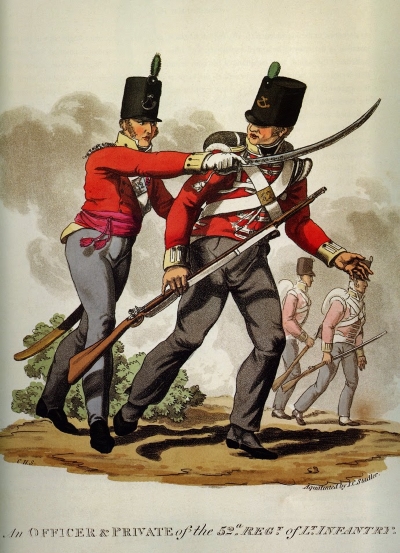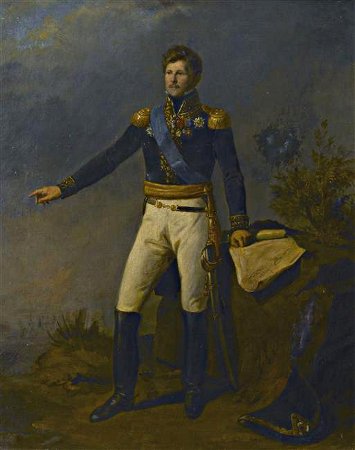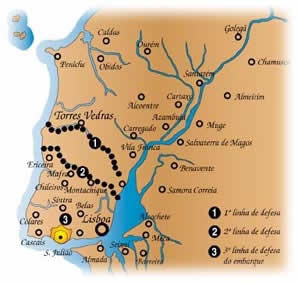|
Battle Of Grijó
The Battle of Grijó () (10–11 May 1809) was a battle that ended in victory for the Anglo-Portuguese Army commanded by Sir Arthur Wellesley (the future 1st Duke of Wellington) over the French army commanded by Marshal Nicolas Soult during the second French invasion of Portugal in the Peninsular War. The next day, Wellesley drove Soult from Porto in the Second Battle of Porto. Background The Second Portuguese campaign started with the Battle of Braga. Battle On 10 May British Cavalry under the command of General Sir Stapleton Cotton came into contact with outlying French Forces, after a short engagement they were scatted, both sides only suffering light casualties, but many French prisoners were taken. The following day, on the 10th, a larger force commanded by General Julien Augustin Joseph Mermet defended the forested ridge, south of Grijo. the Anglo-allied forces under the command of Sir Arthur Wellesley (later Duke of Wellington) attacked them from the south, using a ... [...More Info...] [...Related Items...] OR: [Wikipedia] [Google] [Baidu] |
Peninsular War
The Peninsular War (1807–1814) was the military conflict fought in the Iberian Peninsula by Spain, Portugal, and the United Kingdom against the invading and occupying forces of the First French Empire during the Napoleonic Wars. In Spain, it is considered to overlap with the Spanish War of Independence. The war started when the French and Spanish armies invaded and occupied Portugal in 1807 by transiting through Spain, and it escalated in 1808 after Napoleonic France occupied Spain, which had been its ally. Napoleon Bonaparte forced the abdications of Ferdinand VII and his father Charles IV and then installed his brother Joseph Bonaparte on the Spanish throne and promulgated the Bayonne Constitution. Most Spaniards rejected French rule and fought a bloody war to oust them. The war on the peninsula lasted until the Sixth Coalition defeated Napoleon in 1814, and is regarded as one of the first wars of national liberation. It is also significant for the emergence of larg ... [...More Info...] [...Related Items...] OR: [Wikipedia] [Google] [Baidu] |
Battle Of Braga (1809)
The Battle of Braga or Battle of Póvoa de Lanhoso or Battle of Carvalho d'Este (20 March 1809) saw an Imperial French corps led by Marshal Nicolas Soult attack a Portuguese army commanded by Baron Christian Adolph Friedrich von Eben. When Soult's professional soldiers attacked, the Portuguese at first fought back but soon ran away. The French slaughtered large numbers of their opponents, who were mostly badly disciplined and poorly armed militia. The action was part of the second invasion of Portugal, during the Peninsular War. After the Battle of Corunna and the British evacuation of northwest Spain, Soult turned his attention to the invasion of Portugal. Fighting their way through swarms of Spanish guerillas, Soult's troops crossed the border into Portugal in early March 1809. After capturing Chaves, Soult's II Corps encountered a horde of unruly militiamen who had just assassinated their commander. The subsequent easy French victory did not discourage the Portuguese re ... [...More Info...] [...Related Items...] OR: [Wikipedia] [Google] [Baidu] |
Battalion Of Detachments
A battalion of detachments is a term used to refer to Battalion#British Army, battalion-sized units of the British Army formed from personnel drawn from several parent units. They were used to temporarily collect together detached companies or individual stragglers into more manageable-sized formations for logistics purposes or to provide additional fighting forces. Two longer-term battalions were raised by Arthur Wellesley, 1st Duke of Wellington, Arthur Wellesley in 1809 for service in the Peninsular War. These comprised stragglers left behind following the British withdrawal at Corunna and saw action in the Battle of Oporto, Oporto and Battle of Talavera, Talavera campaigns before they were disbanded and the men returned to their regiments. Though effective on the battlefield criticism was made of their discipline in camp and on the march and there was concern over the impact on manpower in their parent regiments. Other battalions of detachments were later formed in the fiel ... [...More Info...] [...Related Items...] OR: [Wikipedia] [Google] [Baidu] |
Rifle Brigade (Prince Consort's Own)
The Rifle Brigade (The Prince Consort's Own) was an infantry rifle regiment of the British Army formed in January 1800 as the "Experimental Corps of Riflemen" to provide sharpshooters, scouts, and skirmishers. They were soon renamed the "Rifle Corps". In January 1803, they became an established regular regiment and were titled the 95th Regiment of Foot (Rifles). In 1816, at the end of the Napoleonic Wars, they were again renamed, this time as the "Rifle Brigade". The unit was distinguished by its use of green uniforms in place of the traditional redcoat as well as by being armed with the Baker rifle, which was the first British-made rifle accepted by the British Army in place of smooth-bore muskets. The 95th was the first regular infantry corps in the British Army to be so armed. They performed distinguished service in both the First and Second World Wars. Post war, in 1958 the regiment formed part of the Green Jackets Brigade as 3rd Green Jackets and was amalgamated with the ... [...More Info...] [...Related Items...] OR: [Wikipedia] [Google] [Baidu] |
Julien Augustin Joseph Mermet
General Julien Augustin Joseph Mermet (born Le Quesnoy 9 May 1772 – died Paris 28 October 1837) fought in the Napoleonic Wars as a division commander in Italy and in the Peninsular War. Empire Mermet commanded a dragoon division in Marshal André Masséna's army during the 1805 Italian campaign. In 1806, still commanding his cavalry division (23rd, 29th and 30th Dragoon Regiments), he was present at the siege and capture of the fortress of Gaeta, on the west coast of Italy. During the second French invasion of Portugal in 1809, Mermet led a division under Marshal Nicolas Soult. He fought at the First Battle of Porto on 28 March and the Battle of Grijó on 11 May. Before the Second Battle of Porto his unit was sent away to guard Soult's artillery and baggage. Mermet led his infantry division at the Battle of Serem at Vouga and Marnel Rivers. In the third French invasion of Portugal, Mermet commanded the 2nd Division in Marshal Michel Ney's VI Corps. He fought at the sieges o ... [...More Info...] [...Related Items...] OR: [Wikipedia] [Google] [Baidu] |
Battle Of Braga
A battle is an occurrence of combat in warfare between opposing military units of any number or size. A war usually consists of multiple battles. In general, a battle is a military engagement that is well defined in duration, area, and force commitment. An engagement with only limited commitment between the forces and without decisive results is sometimes called a skirmish. The word "battle" can also be used infrequently to refer to an entire operational campaign, although this usage greatly diverges from its conventional or customary meaning. Generally, the word "battle" is used for such campaigns if referring to a protracted combat encounter in which either one or both of the combatants had the same methods, resources, and strategic objectives throughout the encounter. Some prominent examples of this would be the Battle of the Atlantic, Battle of Britain, and Battle of Stalingrad, all in World War II. Wars and military campaigns are guided by military strategy, wherea ... [...More Info...] [...Related Items...] OR: [Wikipedia] [Google] [Baidu] |
Duke Of Wellington (title)
Duke of Wellington is a title in the Peerage of the United Kingdom. The name derived from Wellington in Somerset. The title was created in 1814 for Arthur Wellesley, 1st Marquess of Wellington (1769–1852; born as The Hon. Arthur Wesley), the Anglo-Irish military commander who is best known for leading the decisive victory with Field Marshal von Blücher over Napoleon's forces at Waterloo in Brabant (now Walloon Brabant, Belgium). Wellesley later served twice as British prime minister. The first Duke's father, Garret Wesley, had been granted the title of Earl of Mornington in 1760. His male-line ancestors were wealthy agricultural and urban landowners in both countries, among the Anglo-Irish Protestant Ascendancy. The dukedom has descended to heirs male of the body, along with eleven other hereditary titles. History The titles of Duke of Wellington and Marquess Douro were bestowed upon Arthur Wellesley, 1st Marquess of Wellington, on 3 May 1814 after he returned home a hero ... [...More Info...] [...Related Items...] OR: [Wikipedia] [Google] [Baidu] |
Anglo-Portuguese Army
The Anglo-Portuguese Army was the combined United Kingdom of Great Britain and Ireland, British and Portugal, Portuguese army that participated in the Peninsular War, under the command of Arthur Wellesley, 1st Duke of Wellington, Arthur Wellesley. The Army is also referred to as the British-Portuguese Army and, in Portuguese language, Portuguese, as the ''Exército Anglo-Luso'' or the ''Exército Anglo-Português''. The Anglo-Portuguese Army was established with the British Army deployed to the Iberian Peninsula under the command of General Arthur Wellesley, and the Portuguese Army rebuilt under the leadership of British General William Beresford, 1st Viscount Beresford, William Beresford and the Portuguese minister of defense, War Secretary Miguel Pereira Forjaz. The new Portuguese battalions were supplied with British equipment, trained to British standards and thoroughly re-organised. Incompetent or corrupt officers were Cashiering, cashiered and appropriate replacements were ... [...More Info...] [...Related Items...] OR: [Wikipedia] [Google] [Baidu] |
Battle Of Fuentes De Oñoro
In the Battle of Fuentes de Oñoro (3–5 May 1811), the British–Portuguese Army under Wellington checked an attempt by the French Army of Portugal under Marshal André Masséna to relieve the besieged city of Almeida. A bloody stalemate was not the sort of battle that had been expected to follow André Masséna's expulsion from Portugal. His confidence and moral authority having been much boosted by Torres Vedras, the spring of 1811 found Wellington intending to move over to the offensive, for which policy he had received de facto authorisation from his political masters in London, where talks of major reductions in the size of the army employed in Portugal had been replaced by promises of major reinforcements. Supply difficulties, sickness amongst the troops and want of siege artillery ensured that in the short term no great strokes of strategy could be envisaged, but it was hoped that Almeida, Ciudad Rodrigo and Badajoz might be all recaptured, thereby opening the wa ... [...More Info...] [...Related Items...] OR: [Wikipedia] [Google] [Baidu] |
Battle Of Sabugal
The Battle of Sabugal was an engagement of the Peninsular War which took place on 3 April 1811 between Anglo-Portuguese forces under Arthur Wellesley (later the Duke of Wellington) and French troops under the command of Marshal André Masséna. It was the last of many skirmishes between Masséna's retreating French forces and those of the Anglo-Portuguese under Wellington, who were pursuing him after the failed 1810 French invasion of Portugal. In poor weather, with heavy rain and fog, Allied forces succeeded in forcing the demoralized French force into retreat. The victory was lauded by the British; Sir Harry Smith, then a junior officer of the 95th Rifles and a participant in the battle, remarked "Oh, you Kings and usurpers should view these scenes and moderate ambition" while Wellesley later referred to the Light Division's action in the battle as "one of the most glorious that British troops were ever engaged in". Background By October 1810, Marshal Massena’s Fren ... [...More Info...] [...Related Items...] OR: [Wikipedia] [Google] [Baidu] |
Battle Of Redinha
The Battle of Redinha was a rearguard action which took place on March 12, 1811, during Masséna's retreat from Portugal, by a French division under Marshal Ney against a considerably larger Anglo-Portuguese force under Wellington. Challenging the Allies with only one or two divisions, Ney's 7,000 troops were pitched against 25,000 men. In a typical rearguard action, Ney delayed the Allied advance for a day and bought valuable time for the withdrawal of the main body of the French army. Redinha was the second and most successful rearguard action fought during Masséna's retreat from the Lines of Torres Vedras in the spring of 1811. Having held off the British at Pombal on 11 March, Marshal Ney and the French rearguard had retreated to Redinha. Here he took up an apparently vulnerable position, with Mermet's division on a plateau south of the village, and Marchand's division north of the village on the far side of the Ancos River, linked by a narrow bridge, but Wellington was ... [...More Info...] [...Related Items...] OR: [Wikipedia] [Google] [Baidu] |
Lines Of Torres Vedras
The Lines of Torres Vedras were lines of forts and other military defences built in secrecy to defend Lisbon during the Peninsular War. Named after the nearby town of Torres Vedras, they were ordered by Arthur Wellesley, Viscount Wellington, constructed by Sir Richard Fletcher, 1st Baronet, and his Portuguese workers between November 1809 and September 1810, and used to stop Marshal Masséna's 1810 offensive. The Lines were declared a National Heritage by the Portuguese Government in March 2019. Development At the beginning of the Peninsular War (1807–14) France and Spain signed the Treaty of Fontainebleau in October 1807. This provided for the invasion and subsequent division of Portuguese territory into three kingdoms. Subsequently, French troops under the command of General Junot entered Portugal, which requested support from the British. In July 1808 troops commanded by Sir Arthur Wellesley, the later Duke of Wellington, landed in Portugal and defeated French tro ... [...More Info...] [...Related Items...] OR: [Wikipedia] [Google] [Baidu] |




